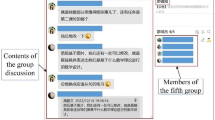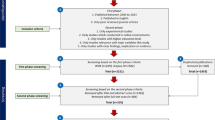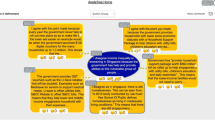Abstract
Peer feedback is known to have positive effects on knowledge improvement in a collaborative learning environment. Attributed to technology affordances, class-wide peer feedback could be garnered at a wider range in the networked learning environment. However, more empirical studies are needed to explore further the effects of type and depth of feedback on knowledge improvement. In this mixed method research, 38 students underwent a computer-supported collaborative learning (CSCL) lesson in an authentic classroom environment. Both quantitative and qualitative analyses were conducted on the collected data. Pre- and post-test comparison results showed that students’ conceptual knowledge on adaptations improved significantly after the CSCL lesson. Qualitative analysis was conducted to examine how the knowledge improved before and after the peer feedback process. The results showed that the class-wide intergroup peer feedback supported learners, with improvement to the quality of their conceptual knowledge when cognitive capacity had reached its maximum at the group level. The peer comments that seek further clarity and suggestions prompted deeper conceptual understanding, leading to knowledge improvement. However, such types of feedback were cognitively more demanding to process. The implications of the effects of type of peer feedback on knowledge improvement and the practical implications of the findings for authentic classroom environments are discussed.













Similar content being viewed by others
Explore related subjects
Discover the latest articles, news and stories from top researchers in related subjects.Data availability
Data are not publicly available to preserve individuals’ privacy under the Personal Data Protection Commission (PDPC) Singapore.
References
Alqassab, M., Strijbos, J. W., & Ufer, S. (2019). Preservice mathematics teachers’ beliefs about peer feedback, perceptions of their peer feedback message, and emotions as predictors of peer feedback accuracy and comprehension of the learning task. Assessment & Evaluation in Higher Education, 44(1), 139–154.
Amara, S., Macedo, J., Bendella, F., & Santos, A. (2016). Group formation in mobile computer supported collaborative learning contexts: A systematic literature review. Journal of Educational Technology & Society, 19(2), 258–273.
Barron, B. (2003). When smart groups fail. The Journal of the Learning Sciences, 12(3), 307–359.
Borge, M., & Mercier, E. (2019). Towards a micro-ecological approach to CSCL. International Journal of Computer-Supported Collaborative Learning, 14(2), 219–235.
Carless, D. (2019). Feedback loops and the longer-term: Towards feedback spirals. Assessment & Evaluation in Higher Education, 44(5), 705–714.
Carless, D. (2022). From teacher transmission of information to student feedback literacy: Activating the learner role in feedback processes. Active Learning in Higher Education, 23(2), 143–153.
Carless, D., & Boud, D. (2018). The development of student feedback literacy: Enabling uptake of feedback. Assessment & Evaluation in Higher Education, 43(8), 1315–1325.
Carless, D., Salter, D., Yang, M., & Lam, J. (2011). Developing sustainable feedback practices. Studies in Higher Education, 36(4), 395–407.
Chang, C.-C., Tseng, K.-H., & Lou, S.-J. (2012a). A comparative analysis of the consistency and difference among teacher-assessment, student self-assessment and peer-assessment in a web-based portfolio assessment environment for high school students. Computers & Education, 58(1), 303–320.
Chang, N., Watson, A. B., Bakerson, M. A., Williams, E. E., McGoron, F. X., & Spitzer, B. (2012). Electronic feedback or handwritten feedback: What do undergraduate students prefer and why?. Journal of Teaching and Learning with Technology, 1(1), 1–23.
Chen, W., Tan, J. S., & Pi, Z. (2021). The spiral model of collaborative knowledge improvement: An exploratory study of a networked collaborative classroom. International Journal of Computer-Supported Collaborative Learning, 16(1), 7–35.
Chen, W., Pi, Z., Tan, J. S., & Lyu, Q. (2022). Preparing pre-service teachers for instructional innovation with ICT via co-design practice. Australasian Journal of Educational Technology, 38(5), 133–145.
Chen, W., Tan, J. S., Zhang, S., Pi, Z., & Lyu, Q. (2023). AppleTree system for effective computer-supported collaborative argumentation: an exploratory study. Educational technology research and development, 1–34. https://doi.org/10.1007/s11423-023-10258-5
Cheng, K.-H., Liang, J.-C., & Tsai, C.-C. (2015). Examining the role of feedback messages in undergraduate students’ writing performance during an online peer assessment activity. The Internet and Higher Education, 25, 78–84.
Csanadi, A., Eagan, B., Kollar, I., Shaffer, D. W., & Fischer, F. (2018). When coding-and-counting is not enough: Using epistemic network analysis (ENA) to analyze verbal data in CSCL research. International Journal of Computer-Supported Collaborative Learning, 13(4), 419–438.
De Sixte, R., Mañá, A., Ávila, V., & Sánchez, E. (2020). Warm elaborated feedback. Exploring its benefits on post-feedback behaviour. Educational Psychology, 40(9), 1094–1112.
De Wever, B., Schellens, T., Valcke, M., & Van Keer, H. (2006). Content analysis schemes to analyze transcripts of online asynchronous discussion groups: A review. Computers & education, 46(1), 6–28.
Dillenbourg, P., Jermann, P., Khine, M. S., Saleh, I. M. (2010) New Science of Learning Technology for Classroom Orchestration. Springer, New York, NY, pp 525–552
Ekahitanond, V. (2013). Promoting university students’ critical thinking skills through peer feedback activity in an online discussion forum. Alberta Journal of Educational Research, 59(2), 247–265.
Fan, Y., & Xu, J. (2020). Exploring student engagement with peer feedback on L2 writing. Journal of Second Language Writing, 50, 100775.
Farrokhnia, M., Pijeira-Díaz, H. J., Noroozi, O., & Hatami, J. (2019). Computer-supported collaborative concept mapping: The effects of different instructional designs on conceptual understanding and knowledge co-construction. Computers & Education, 142, 103640.
Finn, B., Thomas, R., & Rawson, K. A. (2018). Learning more from feedback: Elaborating feedback with examples enhances concept learning. Learning and Instruction, 54, 104–113.
Fong, C. J., Schallert, D. L., Williams, K. M., Williamson, Z. H., Lin, S., Kim, Y. W., & Chen, L. H. (2021). Making feedback constructive: The interplay of undergraduates’ motivation with perceptions of feedback specificity and friendliness. Educational Psychology, 41(10), 1241–1259.
Garrison, D. R., & Akyol, Z. (2015). Toward the development of a metacognition construct for communities of inquiry. The Internet and Higher Education, 24, 66–71.
Gielen, M., & De Wever, B. (2015). Structuring the peer assessment process: A multilevel approach for the impact on product improvement and peer feedback quality. Journal of Computer Assisted Learning, 31(5), 435–449.
Gielen, S., Peeters, E., Dochy, F., Onghena, P., & Struyven, K. (2010). Improving the effectiveness of peer feedback for learning. Learning and Instruction, 20(4), 304–315.
Goodman, J. S., Wood, R. E., & Hendrickx, M. (2004). Feedback specificity, exploration, and learning. Journal of Applied Psychology, 89(2), 248.
Hämäläinen, R., & Arvaja, M. (2009). Scripted collaboration and group-based variations in a higher education CSCL context. Scandinavian Journal of Educational Research, 53(1), 1–16.
Hattie, J., & Timperley, H. (2007). The power of feedback. Review of Educational Research, 77(1), 81–112.
Hovardas, T., Tsivitanidou, O. E., & Zacharia, Z. C. (2014). Peer versus expert feedback: An investigation of the quality of peer feedback among secondary school students. Computers & Education, 71, 133–152.
Huang, J., Hmelo-Silver, C. E., Jordan, R., Gray, S., Frensley, T., Newman, G., & Stern, M. J. (2018). Scientific discourse of citizen scientists: Models as a boundary object for collaborative problem solving. Computers in Human Behavior, 87, 480–492.
Huisman, B., Saab, N., Van Driel, J., & Van Den Broek, P. (2018). Peer feedback on academic writing: Undergraduate students’ peer feedback role, peer feedback perceptions and essay performance. Assessment & Evaluation in Higher Education, 43(6), 955–968.
Jeong, H., Hmelo-Silver, C. E., & Jo, K. (2019). Ten years of computer-supported collaborative learning: A meta-analysis of CSCL in STEM education during 2005–2014. Educational Research Review, 28, 100284.
Khosa, D. K., & Volet, S. E. (2014). Productive group engagement in cognitive activity and metacognitive regulation during collaborative learning: Can it explain differences in students’ conceptual understanding? Metacognition and Learning, 9(3), 287–307.
Kirschner, P. A., & Erkens, G. (2013). Toward a framework for CSCL research. Educational Psychologist, 48(1), 1–8.
Kollar, I., & Fischer, F. (2010). Peer assessment as collaborative learning: A cognitive perspective. Learning and Instruction, 20(4), 344–348.
Lam, C., & Habil, H. (2020). Peer feedback in technology-supported learning environment: A comprehensive review. International Journal of Academic Research in Business and Social Sciences, 10(9), 762–784.
Lara, S., Álvaro, G., Muraciole, N. & Sobrino, Á. (2016). Strategies for applying formative assessment with an iPad in an elementary school. In Proceedings of Ed Media 2016-World Conference on Educational Media and Technology (pp. 1215-1221). Vancouver, BC, Canada: Association for the Advancement of Computing in Education (AACE). Retrieved June 22, 2023 from https://www.learntechlib.org/primary/p/173101/
Latifi, S., Noroozi, O., & Talaee, E. (2021). Peer feedback or peer feedforward? Enhancing students’ argumentative peer learning processes and outcomes. British Journal of Educational Technology, 52(2), 768–784.
Li, X., Ouyang, F., & Chen, W. (2022). Examining the effect of a genetic algorithm-enabled grouping method on collaborative performances, processes, and perceptions. Journal of Computing in Higher Education, 34(3), 790–819.
Lizzio, A., & Wilson, K. (2008). Feedback on assessment: Students’ perceptions of quality and effectiveness. Assessment & Evaluation in Higher Education, 33(3), 263–275.
Looi, C. K., Chen, W., & Patton, C. M. (2010). Principles and enactment of rapid collaborative knowledge building in classrooms. Educational technology: The magazine for managers of change in education, 50(5), 26–31.
Lu, J., & Law, N. (2012). Online peer assessment: Effects of cognitive and affective feedback. Instructional Science, 40(2), 257–275.
Ma, Q. (2020). Examining the role of inter-group peer online feedback on wiki writing in an EAP context. Computer Assisted Language Learning, 33(3), 197–216.
McConlogue, T. (2020). Assessment and Feedback in Higher Education: A guide for teachers. UCL Press.
Meyer, B. J., Wijekumar, K., Middlemiss, W., Higley, K., Lei, P. W., Meier, C., & Spielvogel, J. (2010). Web-based tutoring of the structure strategy with or without elaborated feedback or choice for fifth-and seventh-grade readers. Reading Research Quarterly, 45(1), 62–92.
Misiejuk, K., Wasson, B., & Egelandsdal, K. (2021). Using learning analytics to understand student perceptions of peer feedback. Computers in Human Behavior, 117, 106658.
Moore, C., & Teather, S. (2013). Engaging students in peer review: Feedback as learning. Issues in Educational Research, 23(2), 196-211.
Papadopoulos, P. M., Demetriadis, S. N., Weinberger, A. (2013). Make it explicit: Improving collaboration through increase of script coercion. Journal of Computer Assisted Learning, 29(4), 383–398. https://doi.org/10.1111/jcal.12014
Park, J.-A., Johnson, D. A., Moon, K., & Lee, J. (2019). The interaction effects of frequency and specificity of feedback on work performance. Journal of Organizational Behavior Management, 39(3–4), 164–178.
Patchan, M. M., Schunn, C. D., & Correnti, R. J. (2016). The nature of feedback: How peer feedback features affect students’ implementation rate and quality of revisions. Journal of Educational Psychology, 108(8), 1098.
Perkins, D. (2003). King Arthur's round table: How collaborative conversations create smart organizations. John Wiley & Sons.
Prins, F. J., Sluijsmans, D. M., Kirschner, P. A., & Strijbos, J. W. (2005). Formative peer assessment in a CSCL environment: A case study. Assessment & Evaluation in Higher Education, 30(4), 417–444.
Renkl, A., Mandl, H., & Gruber, H. (1996). Inert knowledge: Analyses and remedies. Educational Psychologist, 31(2), 115–121.
Rittle-Johnson, B., Siegler, R. S., & Alibali, M. W. (2001). Developing conceptual understanding and procedural skill in mathematics: An iterative process. Journal of Educational Psychology, 93(2), 346.
Roschelle, J. (2013). Special issue on CSCL: Discussion. Educational Psychologist, 48(1), 67–70.
Salmon, A. K. (2010). Making thinking visible through action research. Early Childhood Education, 39(1), 15–21.
Scardamalia, M., & Bereiter, C. (1994). Computer support for knowledge-building communities. The Journal of the Learning Sciences, 3(3), 265–283.
Shaffer, D. W., & Ruis, A. R. (2017). Epistemic network analysis: a worked example of theory-based learning analytics. https://doi.org/10.18608/hla17.015
Shaffer, D. W., Collier, W., & Ruis, A. R. (2016). A tutorial on epistemic network analysis: Analyzing the structure of connections in cognitive, social, and interaction data. Journal of Learning Analytics, 3(3), 9–45.
Shute, V. J. (2008). Focus on formative feedback. Review of Educational Research, 78(1), 153–189.
Suthers, D. D., Dwyer, N., Medina, R., & Vatrapu, R. (2010). A framework for conceptualizing, representing, and analyzing distributed interaction. International Journal of Computer-Supported Collaborative Learning, 5(1), 5–42.
Suthers, D. D. (2006). Technology affordances for intersubjective meaning making: A research agenda for CSCL. International Journal of Computer-Supported Collaborative Learning, 1(3), 315–337.
Tai, J.H.-M., Canny, B. J., Haines, T. P., & Molloy, E. K. (2016). The role of peer-assisted learning in building evaluative judgement: Opportunities in clinical medical education. Advances in Health Sciences Education, 21(3), 659–676.
Tan, J. S., & Chen, W. (2022). Peer feedback to support collaborative knowledge improvement: What kind of feedback feed-forward? Computers & Education, 187, 104467.
Tao, P.-K., & Gunstone, R. F. (1999). Conceptual change in science through collaborative learning at the computer. International Journal of Science Education, 21(1), 39–57.
Tolmie, A. K., Topping, K. J., Christie, D., Donaldson, C., Howe, C., Jessiman, E., ... & Thurston, A. (2010). Social effects of collaborative learning in primary schools. Learning and Instruction, 20(3), 177–191.
Topping, K. J. (2009). Peer assessment. Theory into Practice, 48(1), 20–27.
Topping, K. (2018). Using peer assessment to inspire reflection and learning. Routledge.
Van der Kleij, F. M., Feskens, R. C., & Eggen, T. J. (2015). Effects of feedback in a computer-based learning environment on students’ learning outcomes: A meta-analysis. Review of Educational Research, 85(4), 475–511.
van Leeuwen, A., & Janssen, J. (2019). A systematic review of teacher guidance during collaborative learning in primary and secondary education. Educational Research Review, 27(1), 71–89.
van Popta, E., Kral, M., Camp, G., Martens, R. L., & Simons, P. R. J. (2017). Exploring the value of peer feedback in online learning for the provider. Educational Research Review, 20(1), 24–34.
Wen, Y., Looi, C.-K., & Chen, W. (2011). Towards a model for rapid collaborative knowledge improvement in classroom language learning. In H. Spada, G. Stahl, N. Miyake & N. Law (Eds.), Proceedings of Computer Supported Collaborative Learning (CSCL) 2011 (Part 2, pp. 836–840). Hong Kong, China: International Society of the Learning Sciences.
Wu, Y., & Schunn, C. D. (2020a). From feedback to revisions: Effects of feedback features and perceptions. Contemporary Educational Psychology, 60, 101826.
Wu, Y., & Schunn, C. D. (2020b). When peers agree, do students listen? The central role of feedback quality and feedback frequency in determining uptake of feedback. Contemporary Educational Psychology, 62, 101897.
Wu, Y., & Schunn, C. D. (2021). From plans to actions: A process model for why feedback features influence feedback implementation. Instructional Science, 49(3), 365–394.
Zong, Z., Schunn, C. D., & Wang, Y. (2021). What aspects of online peer feedback robustly predict growth in students’ task performance? Computers in Human Behavior, 124, 106924.
Acknowledgements
Please refer to the acknowledgements attachment.
Author information
Authors and Affiliations
Corresponding author
Additional information
Publisher's note
Springer Nature remains neutral with regard to jurisdictional claims in published maps and institutional affiliations.
Rights and permissions
Springer Nature or its licensor (e.g. a society or other partner) holds exclusive rights to this article under a publishing agreement with the author(s) or other rightsholder(s); author self-archiving of the accepted manuscript version of this article is solely governed by the terms of such publishing agreement and applicable law.
About this article
Cite this article
Tan, J.S.H., Chen, W., Su, J. et al. The mechanism and effect of class-wide peer feedback on conceptual knowledge improvement: Does different feedback type matter?. Intern. J. Comput.-Support. Collab. Learn 18, 393–424 (2023). https://doi.org/10.1007/s11412-023-09390-4
Received:
Accepted:
Published:
Issue Date:
DOI: https://doi.org/10.1007/s11412-023-09390-4




